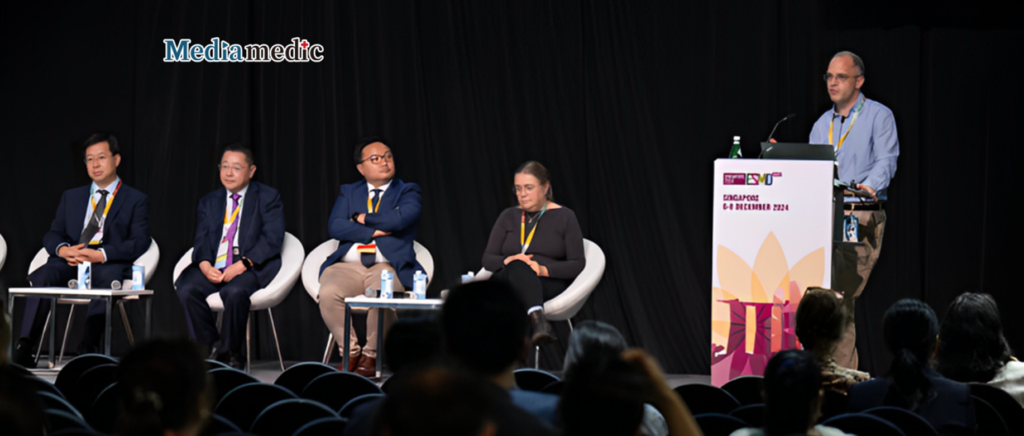
At the 2024 ESMO Asia Congress “Preferred Oral Presentations - Development and Precision Medicine” session, two oral immune checkpoint inhibitors (ICIs) for solid tumors demonstrated initial efficacy and manageable safety in early-phase trials. These results support further development of novel small-molecule PD-L1 inhibitors, which offer favorable benefit-risk profiles and better usability compared to antibody-based ICIs.The latest findings from the first-in-human Phase I trial of ABSK043, an oral small-molecule PD-L1 inhibitor, showed promising safety and initial antitumor activity, particularly in non-small cell lung cancer (NSCLC) patients with high PD-L1 expression (Abstract 478O). These results align with findings from antibody-based ICIs. Among 71 patients receiving pharmacologically active doses of ABSK043 (600–1000 mg, twice daily), 6 (8.5%) experienced Grade ≥3 treatment-related adverse events (TRAEs), with anemia being the most common (3 patients). No dose-limiting toxicities or peripheral neuropathy were observed, and none of the adverse events led to treatment discontinuation.
In 51 evaluable patients treated with ABSK043 (600–1000 mg, twice daily), the objective response rate (ORR) was 19.6%, including 49 ICI-naïve patients. Notably, in 12 ICI-naïve NSCLC patients with a PD-L1 tumor proportion score (TPS) ≥50%—including those with EGFR mutations—the ORR reached 41.7% (5 partial responses). The mechanism of action involves PD-L1 dimerization, leading to receptor downregulation and dose-dependent decreases in PD-L1 expression, alongside changes in T cells and cytokines. Researchers plan to expand studies in NSCLC and tumors with high microsatellite instability (MSI-H) or mismatch repair deficiency (dMMR).
In the ongoing first-in-human Phase I trial of BPI-371153, another oral small-molecule PD-L1 inhibitor, the drug showed manageable safety, favorable pharmacokinetics, and promising antitumor activity (Abstract 59O). Twenty patients received at least one dose of BPI-371153 (100–1600 mg, once daily), including 16 with solid tumors (11 NSCLC patients) and 4 with relapsed/refractory lymphoma. No dose-limiting toxicities were reported, and the maximum tolerated dose was not reached. Three patients experienced Grade ≥3 TRAEs (diarrhea in the 600 mg once-daily group; lymphopenia and skin infection in the 1600 mg once-daily group), but none led to treatment discontinuation. No treatment-related deaths or peripheral neuropathy were reported.
BPI-371153 had a half-life of 20.8–26.2 hours. Pharmacodynamic analyses showed increased levels of IL-18, IL-2, IL-6, CXCL-9, and soluble PD-L1, indicating immune-modulating effects. In patients with high PD-L1 expression or high tumor mutational burden (TMB), the ORR was 23.5%, including one complete response and three partial responses. The study has advanced to an expansion phase with a focus on 200 mg once-daily dosing.
Dr. Stefan Symeonides of the Edinburgh Cancer Research Center commented on the advantages of small-molecule ICIs compared to antibody-based ICIs. He noted that small molecules are less costly to manufacture and administer, more convenient for patients, avoid infusion reactions, and may penetrate tumors more effectively. Additionally, their shorter half-life offers potential advantages in managing immune-related adverse events. However, Dr. Symeonides emphasized that small-molecule ICIs must match the efficacy of antibody-based ICIs without introducing significant new risks, and their development process remains complex.
“These Phase I results for ABSK043 and BPI-371153 suggest tolerability comparable to antibody-based ICIs, with no peripheral neuropathy and clear antitumor activity supported by pharmacodynamic data,” Dr. Symeonides observed. He highlighted the importance of further trials for these oral small-molecule ICIs. Other agents, such as OX-4224 (Evixapodlin/GS-4224), AB-101, and ASC61, are also undergoing early-stage research.
Regarding market potential, Dr. Symeonides stated, “If oral ICIs demonstrate a favorable benefit-risk profile, they could have strong market appeal. However, delays in development may allow next-generation immunotherapies—such as bispecific anti-PD-L1/VEGF antibodies—to outpace them in this field.” He concluded that oral ICIs, if developed efficiently, could fill an unmet need in the immunotherapy landscape.
Reference
1. Yu Y, et al. Updated results of oral PD-L1 inhibitor ABSK043 in advanced solid tumor patients (pts) from a phase I study. ESMO Asia Congress 2024, Abstract 478O2. Yang J, et al. A first-in-human, phase I study of BPI-371153, a novel small-molecule PD-L1 inhibitor, in advanced solid tumors or recurrent/refractory (r/r) lymphoma. ESMO Asia Congress 2024, Abstract 59O


